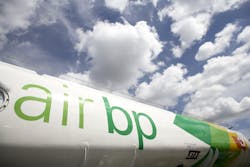Air BP Supplies Customers with Biojet During 'Fly Green Day' at Chicago O’Hare Airport
Air BP announced that it will supply biojet to its customers at Chicago O’Hare International Airport (ORD/KORD) in support of the “Fly Green Day” initiative taking place at the airport and as part of the company’s broader commitment to a lower-carbon future.
It marks the first time that biojet will be delivered via the airport’s existing fuelling infrastructure to customers at one of the world’s busiest airports.
“This is the first time we have supplied our customers with biojet produced from alcohol, and demonstrates how we are working with multiple suppliers to build a leadership position in this area,” said Air BP CEO Jon Platt. “We anticipate that through this promotion we will inspire more of our customers to use lower-carbon fuels.”
Biojet is a blend of conventional jet fuel and renewable jet fuel made from alcohol or plant and vegetable oils.
Fly Green Day, which takes place on Nov. 8, 2017, is an event organized by U.S. advanced renewable fuels company Gevo, Inc., in collaboration with Chicago O’Hare International, to help boost the commercialization of biojet. Air BP worked with Gevo to bring a demonstration batch of biojet produced from bio-isobutanol (an alcohol derived from renewable feedstocks) to customers at the airport.
Providing its expertise throughout the project, Air BP was responsible for blending the aviation biofuel supplied by Gevo with regular Jet A fuel and certifying its quality. The fuel will be supplied by Air BP to its customers through the main fuel hydrant system at the airport. Airline customers supporting the initiative include United Airlines, Lufthansa, Etihad, Cathay Pacific Airways, Emirates, Japan Airlines, Korean Air and Atlas Air, who will be purchasing the biojet to use in their regular scheduled flights.
This latest initiative reinforces Air BP’s commitment to helping the industry transition to a lower-carbon future and achieve the International Air Transport Association’s ambitious targets of carbon neutral growth by 2020 and a reduction in net aviation CO2 emissions of 50 percent by 2050.


